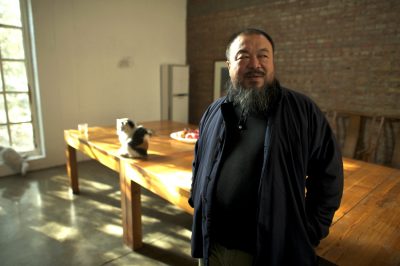
He covered his office wall with the many names of Chinese children who lost their lives in the 2008 Sichuan earthquake. The 7.9 magnitude earthquake not only destroyed schools but also the people’s’ trust in the Chinese government. For months, locals had no information on the total death toll the earthquake had caused. Then, Ai Weiwei came along.
Each Sunday this February, The Institute of Contemporary Art is housing screenings of documentaries featuring artists “on the periphery” of the art world. Last Sunday, the ICA held a screening for the film “Ai Weiwei: Never Sorry.”
Those who attended gleaned an inside look into the life of Chinese political dissident and artist Weiwei, who gained prominence and recognition for the activism he did after the Sichuan earthquake, which killed over 60,000 people.
Weiwei turned his attention to the earthquake after allegations of government censorship arose in its aftermath. He gathered around 100 volunteers, who went door to door and gathered personal information of the victims through their families. However, his online post including the victims’ names was removed by the Chinese government within hours.
“In China, at the moment there is no freedom of expression,” said Catherine Yeh, director of BU’s Center for the Study of Asia and professor of Chinese and comparative literature. “If you say and do something that threatens the establishment, you’re in trouble and the censorship is becoming worse.”
One of Weiwei’s most well-known pieces –– Sunflower Seeds –– consisted of more than two years of work where thousands of volunteers would create each seed from scratch. The porcelain seeds, over 100 million of them, were hand-painted and brushed with three to four strokes in workshops in Jingdezhen, China.
The installation carried a deeper meaning: for Weiwei, the sunflower seeds bare association with Mao Zedong, chairman during China’s Cultural Revolution, which stripped individuals of personal freedoms. During that era, in propaganda, Mao was often depicted as the sun while the Chinese people were illustrated as sunflowers, pulled toward him by design.
“All forms of work are political,” said Eugenio Menegon, a Chinese history professor at BU. “For an artwork to be meaningful, there has to be some sort of politics within.”
Menegon’s favorite of Weiwei works is “Dropping a Han Dynasty Urn.” It includes photos of Weiwei dropping a 2,000-year-old urn, which signified the destruction of Chinese tradition by the government and how a broken urn creates more noise than a broken system.
“Ai’s work is bold, interesting and provocative through the use of modern technology and the ease of reproduction,” Menegon said. “His work enables and inflames imagination within a global audience.”
The documentary also chronicled intimate details of Weiwei’s personal life, like his playful relationship with his toddler son, Lao Ai, who he brings to art installations. Weiwei had his own cameraman by his side filming and documenting his daily life. He documented how Weiwei was beaten by the local police in Chengdu, which the government had consistently denied.
“I am amazed [at] how Ai Weiwei could still operate in China,” Yeh said. “His art acts as a release or relief in the people about the anxiety in the country, about the right to express oneself, and he has become a beacon of that.”
Weiwei’s efforts to overthrow Chinese free-speech laws resulted not only in beatings by police but also constant surveillance from the government, a demolished studio and eventually an 81-day detainment in 2011. During the time of his disappearance, supporters throughout the country called for his release and set up protests in defiance of the Chinese government.
The documentary ended with a clip of Weiwei singing the song of the Grass-Mud Horse, a Chinese internet meme used to symbolically defy the government’s internet censorship, covertly dedicating the performance to his motherland.
“It’s funny yet despairing –– the fact that Ai Weiwei is probably more well-known in the international sphere rather than in China itself,” said Ted Boerger, a junior at the Massachusetts Institute of Technology who attended the screening. “I look forward to seeing him speak up and be the voice for the citizens in China while he still can.”

















































































































